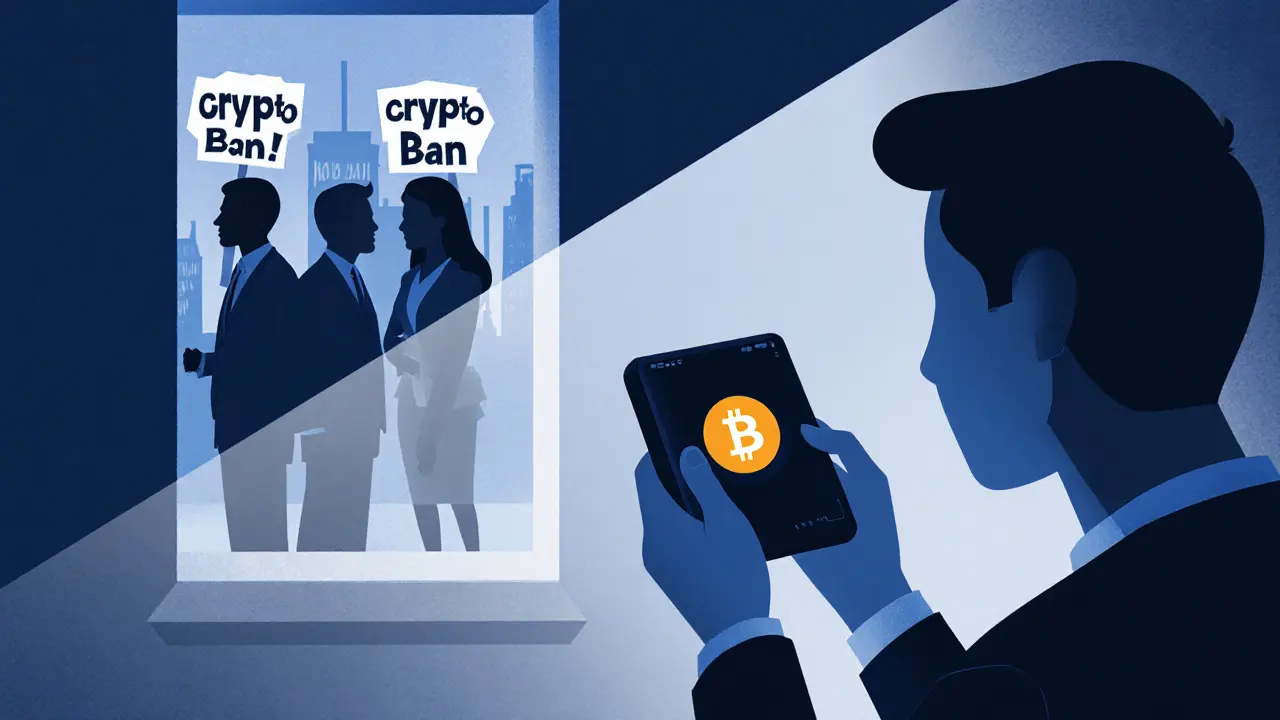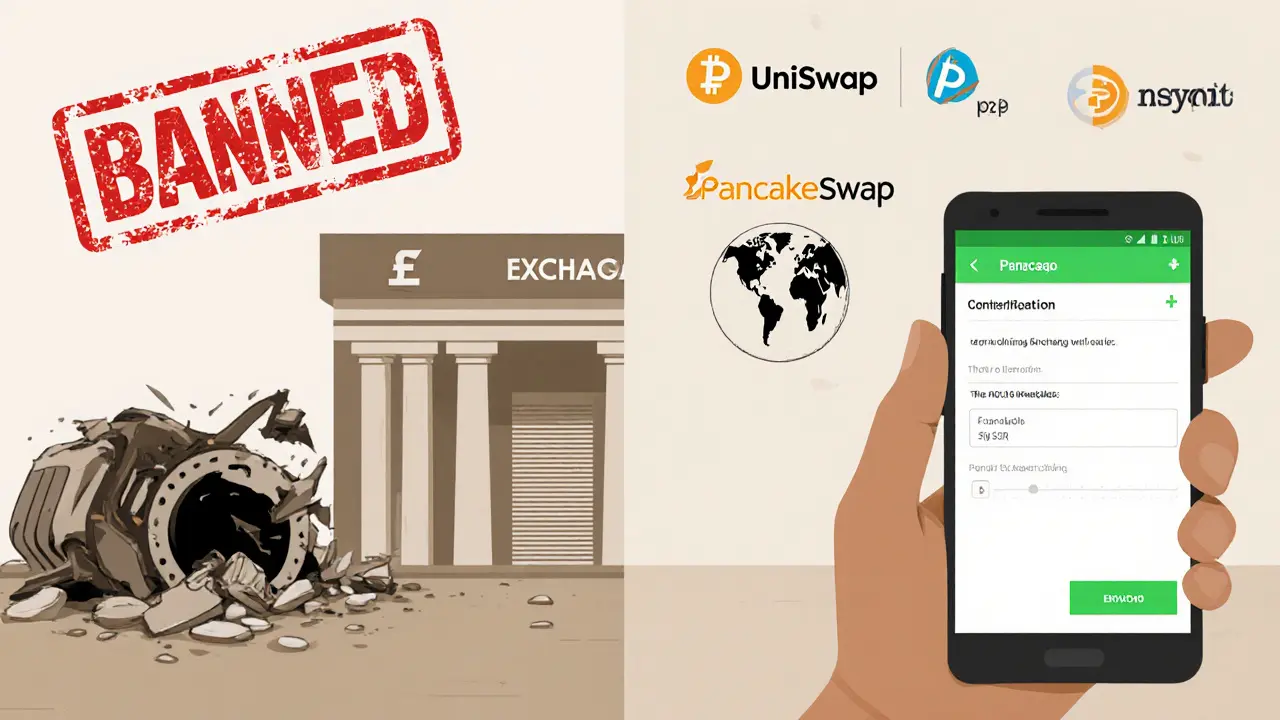Criminal Penalties for Crypto Ban Violations Worldwide: What You Need to Know
 Nov, 21 2025
Nov, 21 2025
Crypto Ban Penalty Calculator
Calculate Your Crypto Ban Risk
Results
Select a country and violation type to see potential penalties.
It’s 2025, and you’re in a country where owning Bitcoin is technically a crime. You didn’t rob a bank. You didn’t fund terrorists. You just bought some crypto on a peer-to-peer app to protect your savings from inflation. Now, what happens if you get caught?
Where Is Crypto Actually Banned?
Out of 75 countries studied in 2025, only 10 have outright bans on cryptocurrency. That means over 85% of the world allows some form of crypto use. But in those 10 countries, the rules are harsh - and enforcement varies wildly.Algeria, for example, bans the purchase, sale, use, and even holding of virtual currency under Article 117 of its 2017 official journal. The law says violations are punishable “in accordance with existing laws,” but it doesn’t say how much jail time or fines you’ll face. Morocco’s central bank declared Bitcoin a “financial asset” - not money - and said using it breaks exchange regulations. Egypt prohibits banks and individuals from dealing in crypto, but again, no clear penalty details are published.
China is the most extreme case. Since 2021, it has shut down all crypto exchanges, mining operations, and trading platforms. But here’s the twist: the government doesn’t go after regular people holding Bitcoin in their wallets. They go after companies. Miners get shut down. Exchanges get raided. Individuals? Rarely prosecuted. Chainalysis estimated $28.7 billion in peer-to-peer crypto transactions came from China in 2024 - despite the ban.
What Are the Actual Criminal Penalties?
If you’re caught breaking a crypto ban, what’s the worst that can happen? It depends on where you are.In Algeria and Morocco, penalties are vague. You might get fined, or your assets seized. Jail time isn’t officially listed, but authorities can use general financial crime laws to charge you. In Egypt, enforcement is patchy. Most people use crypto without consequence. Only a handful of cases have been reported.
But in countries like North Korea and Russia, the stakes are higher. North Korea is accused of using crypto to fund its nuclear program. Russian nationals involved in crypto transactions tied to sanctioned entities have been arrested under anti-money laundering and sanctions evasion laws. In 2024, the U.S. Treasury’s OFAC sanctioned 86 crypto addresses linked to Russia-related actors. That doesn’t mean every Russian with crypto got arrested - it means those tied to specific illicit networks did.
Here’s the reality: criminal penalties for simple crypto ownership are extremely rare. Most arrests happen when crypto is used for money laundering, sanctions evasion, or funding terrorism. The U.S. Department of Justice made this clear in April 2025: they’re dropping “regulation by prosecution.” That means they won’t throw people in jail just because they used crypto - unless it’s tied to fraud, theft, or breaking sanctions.
Why Do Countries Ban Crypto If It Doesn’t Work?
Governments ban crypto for three main reasons: fear of capital flight, fear of money laundering, and fear of losing control over the financial system.In Nigeria and India, people use crypto to send money abroad because official channels are slow or expensive. In Venezuela and Argentina, crypto is a hedge against hyperinflation. In Algeria and Egypt, the government worries citizens will move money out of the country and weaken the local currency.
But data shows bans don’t stop adoption. The Atlantic Council found that even in countries with total crypto bans, adoption rates stayed high. People just switch to peer-to-peer platforms like LocalBitcoins, Paxful, or decentralized exchanges. In Morocco, users reported using crypto for 18 months without legal trouble. In Egypt, payment processors block transactions, but no one gets arrested.
Meanwhile, countries that embraced regulation - like Japan, South Korea, and the EU - saw crypto thrive. Japan recognizes crypto as legal property. South Korea passed the Virtual Asset Users Protection Act in 2023 to require exchanges to keep records and verify users. The EU’s MiCA framework, launched in 2024, treats crypto like any other financial product - regulated, licensed, and monitored - not banned.

Who Gets Punished? The Real Targets
If you’re not a criminal, you’re probably not at risk. The real targets of crypto enforcement are:- Exchanges that don’t follow KYC rules
- Miners operating illegally
- People laundering money for drug cartels or terrorist groups
- Those helping sanctioned countries evade financial restrictions
Take the case of Mustafa Ayash, founder of GazaNow. He wasn’t punished for using Bitcoin. He was sanctioned by the U.S. for raising funds for Hamas after October 7, 2023. His crypto wallets were frozen because he was funding terrorism - not because he owned crypto.
Another example: Elena Chirkinyan and Khadzi-Murat Dalgatovich Magomedov. The UK’s National Crime Agency targeted them for laundering money through crypto. They weren’t arrested for trading Bitcoin. They were arrested for moving stolen funds.
Even in the U.S., where crypto is legal, the Department of Justice focuses on unlicensed money transmission, fraud, and client asset theft - not personal use. The GENIUS Act signed in July 2025 gives the Treasury more power to track stablecoins tied to sanctions evasion - not to jail people for owning Ethereum.
How Do People Bypass Crypto Bans?
If you live in a banned country, you’re not helpless. Here’s how people get around it:- Peer-to-peer (P2P) platforms: LocalBitcoins, Paxful, and Binance P2P let you trade crypto with cash or bank transfers. No exchange account needed.
- Decentralized exchanges (DEXs): Uniswap, PancakeSwap, and 1inch don’t require KYC. You control your wallet.
- VPN and privacy tools: Many users mask their location to access banned platforms.
- Hardware wallets: Storing crypto offline makes it harder for authorities to track or seize.
Trustpilot reviews of banned platforms like KuCoin show 37% of positive reviews mention “easy access from restricted regions.” But 68% of negative reviews cite account freezes - usually because users failed KYC checks. That’s the trade-off: access vs. risk.
And here’s the kicker: in a CoinDesk survey of crypto users in banned countries, only 12% reported any personal legal consequences. That means 88% used crypto without being caught - or punished.

The Global Shift: From Bans to Regulation
The world is moving away from criminalizing crypto use. Even countries that once banned it are changing course.China’s crackdown targeted infrastructure, not individuals. Russia’s ban is inconsistently enforced. Algeria and Morocco haven’t prosecuted a single person for holding Bitcoin. Meanwhile, over 90% of countries are developing their own central bank digital currencies (CBDCs) - meaning governments aren’t trying to kill crypto. They’re trying to replace it with their own version.
The future isn’t about bans. It’s about control. The U.S., EU, and Japan aren’t banning crypto. They’re regulating it. They want to know who’s using it, where the money’s going, and who’s paying taxes. That’s not oppression - it’s oversight.
By 2027, experts predict most countries will follow the EU’s MiCA model: license providers, protect users, track illicit flows - but don’t jail people for owning digital assets.
What Should You Do If You Live in a Banned Country?
If you’re in Algeria, Egypt, Morocco, or another country with a crypto ban, here’s what you need to know:- Don’t assume you’re safe. Laws can change overnight. Enforcement can be random.
- Avoid large transactions. Small, frequent P2P trades are less likely to trigger alerts.
- Use non-KYC platforms carefully. DEXs and hardware wallets give you control - but they also mean no recourse if you lose funds.
- Never use crypto for illegal purposes. Money laundering, sanctions evasion, or funding terror will get you targeted - no matter where you live.
- Stay informed. Follow local news. If your government starts prosecuting users, change your behavior.
The bottom line? Crypto bans are symbolic more than practical. They’re political tools, not effective laws. But that doesn’t mean you should ignore them. Use crypto wisely. Stay low-profile. And know that the world is changing - faster than most governments realize.
Is it illegal to own Bitcoin in Algeria?
Yes, under Article 117 of Algeria’s 2017 financial regulations, it is illegal to purchase, sell, use, or hold virtual currencies. However, the law doesn’t specify exact penalties like jail time or fines. Enforcement is rare, and there are no public records of individuals being prosecuted solely for owning crypto.
Can you go to jail for using crypto in Egypt?
Egypt prohibits banks and financial institutions from dealing in cryptocurrency, and individuals are also technically banned. But in practice, enforcement is minimal. There have been no confirmed cases of individuals being jailed for personal crypto use. Most enforcement targets banks or businesses that facilitate crypto transactions.
Does China jail people for owning Bitcoin?
No. China bans crypto exchanges, mining, and trading platforms - but not individual ownership. People who hold Bitcoin in personal wallets are rarely targeted. The government focuses on shutting down businesses and infrastructure. Chainalysis estimates $28.7 billion in P2P crypto transactions occurred from China in 2024, showing enforcement against individuals is virtually nonexistent.
What’s the difference between a crypto ban and a crypto sanction?
A ban makes crypto use illegal for everyone. A sanction targets specific people, companies, or addresses linked to illegal activity - like terrorism or money laundering. The U.S. doesn’t ban crypto. It sanctions wallets tied to sanctioned entities, like those used by Russian oligarchs or Hamas. You can own crypto legally in the U.S., but if your wallet is linked to a sanctioned address, it gets frozen.
Are crypto penalties the same across all banned countries?
No. Countries like Algeria and Morocco have vague penalties with no clear jail terms. China targets businesses, not individuals. North Korea and Russia have used crypto-related arrests in cases tied to sanctions evasion or national security. Enforcement varies from non-existent to selective - rarely uniform or consistent.
Why do people still use crypto in banned countries?
Because it works. Crypto offers financial freedom where traditional systems fail - escaping inflation, bypassing capital controls, sending money across borders without banks. Even in banned countries, 88% of users report no legal consequences. Peer-to-peer platforms and decentralized exchanges make it easy to stay under the radar.
Will crypto bans disappear by 2027?
Most experts believe so. Countries are shifting from bans to regulation. The EU’s MiCA framework, Japan’s licensing system, and the U.S.’s focus on fraud and sanctions evasion show a global trend: regulate the industry, don’t criminalize users. With central bank digital currencies rising, governments want control - not prohibition.
Looking ahead, the fight isn’t about whether crypto is legal. It’s about who controls it. And right now, the people are winning - even where the laws say they shouldn’t be.